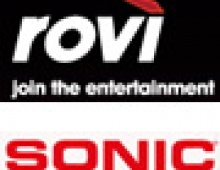
Sonic Solutions soars
The fast-growing Novato-based maker of CD and DVD-burning software has been content in years past to be the hidden engine behind some of the most popular digital media devices in the world.
But the company made major strides in 2004 toward making itself more visible in the living room of the average consumer, industry analysts say.
"They're in the best position out of any software company that does CD or DVD burning," said Justin Cable, a research analyst with B. Riley & Co. in Los Angeles. "They pretty much wrote the book - literally - on DVD (burning)."
The company has high hopes for 2005, as digital entertainment continues to attract consumers - and their dollars. A recent survey by a New York-based research firm projected that consumers will buy approximately 11 million DVD burners for their home PCs over the next 18 months, a substantial increase over earlier forecasts.
Sonic's hopes largely hinge on its ability to capitalize on several deals it made in 2004, according to president Bob Doris, who co-founded the company in 1986 with two fellow Lucasfilm Ltd. alums, including his wife, Mary Sauer.
The company, which will report earnings for the third quarter of its 2005 fiscal year Feb. 8, made those deals to address its two major goals, Doris said.
First, it wanted to hold its ground among companies supplying major computer makers like Dell and Hewlett-Packard with CD and DVD-burning software. But the company also wants to get its products directly into the hands of consumers by putting them on the shelves of consumer electronics stores such as Best Buy and Good Guys.
Late last month, Sonic closed a deal that Doris said should go a long way to making that goal a reality.
Announced in August but finalized in December, Sonic bought the consumer software division of Roxio, the longtime maker of CD-burning products that bought once-controversial digital music file sharing software maker Napster last year.
Roxio wanted to focus exclusively on turning the now-legitimate Napster into a viable revenue source and will now change its name to Napster, allowing Sonic to use the well-known Roxio name on the software it will sell directly to consumers.
"It basically gets rid of their closest competition and they get significant market share as a result," Cable said.
But Cable said the biggest challenge Sonic faces is integrating Roxio smoothly. The deal adds more than 200 employees to Sonic's labor force, bringing it to more than 550 worldwide. The company has yet to say if any layoffs will result from the acquisition.
"There are always risks in any big acquisition," Cable said.
In a similar vein, Sonic bought a company called InterActual in February for $8.8 million. InterActual makes software that movie studios can use to add interactive features to movie releases on DVD. For instance, InterActual created a virtual key on the December DVD release of "Lord of the Rings: Return of the King" that allowed users to find additional content on the Internet.
"Fans of (J.R.R.) Tolkien's work are sure to enjoy the additional depth and interactivity that these online features deliver," said Jean-Paul Leonard, creative director of Company Wide Shut, which created the online features.
But aside from the buzz factor of buying a company such as InterActual, Doris said the real goal was to get a jump on new DVD formats that are expected to reach consumers in late 2005 and early 2006.
"Blue laser" formats, considered the future of the DVD industry, provide video quality to match the resolution of high-definition and plasma television sets that have become increasingly popular in recent years. The formats quadruple the capacity of a DVD and will also include features that will allow users to connect to the Internet. Doris said the new formats will represent "a real quantum leap in our industry."
Sonic is betting on the emergence of the new formats for its other major goal.
Doris contends that the new format will change the type of devices used for DVD burning.
While computers have largely been the domain of DVD recording software and DVD burners, companies are now feverishly trying to get those products into devices like digital video recorders like the popular TiVo model. TiVo allow users to record television programs onto a hard drive.
By having Sonic's software installed on the device, users could then burn those programs onto a DVD.
Last week, TiVo unveiled TiVoToGo, a service that allows users to transfer recorded shows to their PC. The company is about to release versions of its devices that include Sonic software that will allow users to burn recorded programs from a TiVo device or a computer to a DVD.
In November, Sonic signed a deal to include its DVD-burning software on cable set-top boxes made by Scientific Atlanta Inc., the first deal of its kind, according to Doris.
The series of deals puts Sonic in a great position, Cable said. By most accounts, Sonic doesn't have one rival in all of its different businesses, although Mountain View-based Pinnacle Systems appears to be its closest competitor, Cable said.
The financial markets have taken notice of the company's gains in recent months. After a big summertime dip in its stock price, the company's stock has regained ground steadily and is right back near the $19 mark where it started the year.
"There's no reason to believe that they won't continue to lead the industry," he said. "With all of the new DVD formats and the general adoption of DVD recording, there is significant growth ahead."
From Marin Independent Journal

















